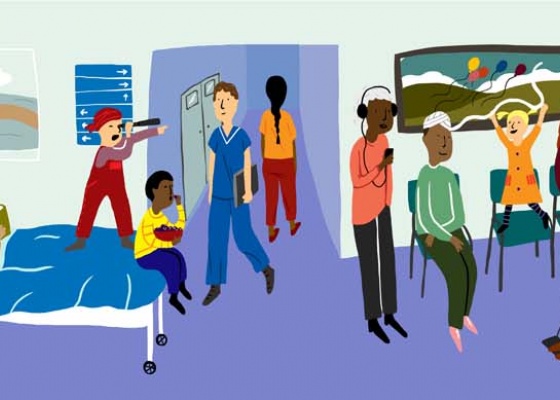As we age, it’s likely that we will develop one or more long-term conditions such as arthritis, heart disease, diabetes, COPD, stroke and high blood pressure.
These conditions cannot be cured, but can be controlled by medication and other therapies.
Sometimes, as the condition progresses, symptoms may cause us to have difficulty with activities of daily living and may also lead to mental health problems, such as depression. There is a risk that we can become malnourished as time goes on.
Take control - if you have a diagnosis try to make sure that you keep eating and drinking enough to keep you well nourished. Tell someone if you feel low, depressed or anxious. Try to understand as much as possible about your condition. This will make you much more able to be independent.
If you have a health condition and are worried about your weight, speak to your GP, practice nurse or pharmacist.
-
Dementia
Maintaining good nutrition is vital for the health, independence and well-being of people with dementia. Difficulties eating and drinking are more noticeable as dementia progresses and unwanted weight loss is a common problem. It is helpful to be aware of some of the changes that can occur as dementia progresses, such as difficulties using cutlery, recognition of food or taste, likes and dislikes for food and drinks changing, and appetites can vary from day to day.
What can we do?
-
Measure and record weight regularly.
-
People with dementia may struggle to ask for food or drink – it should be visible, offered regularly and be available to pick up whenever they feel hungry or thirsty.
-
Food and drinks need to be interesting and what the person likes.
-
If people are walking or pacing, have food available to grab as they pass (remember that they may need increased calories).
-
For people with smaller appetites, large portions at mealtimes may be off-putting. Offer smaller portions at mealtimes with frequent nourishing snacks throughout the day including suppertime, before a person goes to sleep.
- A person with dementia may start to lose their sense of smell. Ensure food is flavoursome and tasty.
-
Delirium
Poor nutritional intake and lack of fluids can contribute to the development and severity of delirium – sometimes referred to as ‘acute confusional state’. Delirium often occurs when a person is already unwell, and can lead to a rapid decline in mental state and behaviour. People with dementia are at a greater risk of developing delirium. The Alzheimer’s Society has more information on delirium here. If you are worried that your friend or relative is showing signs of delirium, make sure that the GP or ward doctor is alerted.
-
Diabetes
If you have diabetes and you’re underweight or struggling with your appetite, it’s important to eat the foods you like rather than being too restrictive with your diet. This may mean eating foods that are higher in fat and calories. Speak with your diabetes team to review your medications and talk to a dietitian to help you make any changes. Diabetes UK has more information and advice about healthy eating here.
-
Arthritis
Arthritis can be a painful condition and symptoms like fatigue can seriously affect what you feel able to do on a daily basis. There is plenty you can do to ease your symptoms, understand your condition and gain a sense of independence. Versus Arthritis has lots of useful information and advice: https://www.versusarthritis.org/about-arthritis/managing-symptoms/diet/
-
High blood pressure
High blood pressure, or hypertension, rarely has noticeable symptoms. But if untreated, it increases your risk of serious problems such as heart attacks and strokes. More than 1 in 4 adults in the UK have high blood pressure, although many will not realise it. The only way to find out if your blood pressure is high is to have your blood pressure checked. More information from the NHS can be found here.
-
Asthma
Asthma is a condition that affects your airways – the small tubes that carry air in and out of the lungs. Stress, poor sleep and diet can make the symptoms of asthma worse. Information about stress triggers for Asthma.
-
Stroke
Stroke is a brain attack. It happens when the blood supply to part of your brain is cut off. It is an emergency. If you spot the signs of stroke in yourself or someone else, call 999. There is no way of knowing if symptoms will pass or get better when they first start, so you need to seek immediate medical help.
Signs of stroke
-
Face: Can the person smile? Has their face fallen on one side?
-
Arms: Can the person raise both arms and keep them there?
-
Speech problems: Can the person speak clearly and understand what you say? Is their speech slurred?
- Time: If you see any of these three signs, it's time to call.
-
Chronic obstructive pulmonary disease - COPD
COPD is a chronic long-term medical condition that affects lungs and does not go away. Airways are narrowed and it becomes harder to breathe out quickly. It’s important to maintain a healthy weight. Carrying extra weight can make breathlessness worse, so it's a good idea to lose weight through a combination of regular exercise and a healthy diet.
Some people may find that they lose weight. Eating food high in protein and taking in enough calories is important. Ask for help and advice from a dietitian as part of a pulmonary rehabilitation programme.
If you feel worried about weight gain or loss, talk to you COPD clinic nurse, GP or practice nurse. More COPD information from the NHS.

